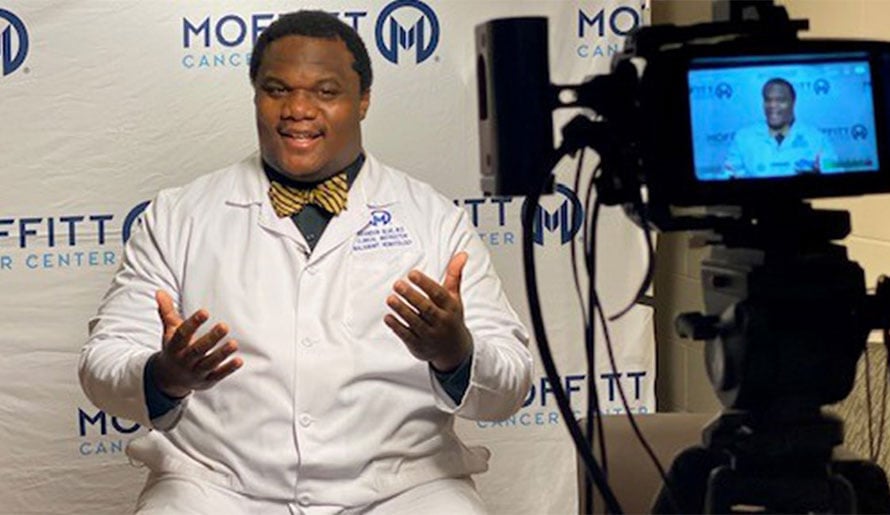Understanding How Blood Cancers Affect the Black/African American Community

Brandon Blue, M.D., has dedicated his career to blood cancers, and now, he’s using his experience and drive to help us better understand why diseases like multiple myeloma disproportionately affect Black/African American people. During the first episode of Moffitt Cancer Center’s new podcast, "Cancer in Our Community," Blue shared practical information about blood cancers and discussed the importance of improving outcomes for Black/African American people facing these diseases.
While disparities exist across all forms of cancer, certain cancers are notoriously worse for Black/African American patients. Multiple myeloma is a prime example. An incurable blood cancer that affects cells in the bone marrow, multiple myeloma is much more common in the Black/African American community -- twice as likely to be diagnosed and at a younger age.
"[We] see that Black/African American patients just don’t do as well," Blue said. "And you say, maybe it’s their income or education level. We've done studies controlling for those things, and unfortunately, just self-identifying as an African American or Black patient leads to worse survival."
Blue is a physician-researcher, meaning he not only treats patients in the hematologic oncology clinic, but he also conducts research through clinical trials and in the laboratory as well. His scientific work, which has been funded in part by a donation from Oncopeptides, is focused on reducing cancer health disparities and improving health outcomes in blood cancers. The question of why these disparities exist in multiple myeloma is a primary issue Blue and his team are working hard to understand.
One of the breakthroughs Blue is most excited about in the realm of blood cancers is CAR T cell therapy, or chimeric antigen reception therapy, an immunological treatment that uses the body’s own immune system to destroy cancerous cells. The therapy has been particularly successful for patients where other treatments have failed. However, after Moffitt began offering CAR T, Blue quickly noticed a disparity with who was benefitting from this revolutionary therapy.
"With any new innovation, we have the opportunity to have a new disparity…The patients having this new groundbreaking treatment looked the same. This is a problem. If we know that a certain group of people isn’t doing as well, why aren’t those people getting that treatment? It just didn’t make sense to me."
As a result, Blue and his team began studying Moffitt’s catchment area, or where Moffitt patients are coming from, to determine how to ensure people from all walks of life can receive cutting-edge treatments like CAR T at the cancer center.
In addition, Blue urged people in the Black/African American community to speak up for themselves and their loved ones, even when it can be intimidating to do so with a trusted doctor. This is especially important with blood cancers, as more subtle symptoms may be ignored even when the person senses that something is not right.
He offers three simple steps that anyone can follow:
- Know your body and communicate when there’s something wrong,
- Get a second opinion, and
- Talk to your family members.
"Ask the doctors those tough questions, because sometimes those answers can save your life."
Listen to Dr. Blue’s full interview on the “Cancer in Our Community” podcast, a production of Moffitt’s Office of Community Outreach, Engagement and Equity. Learn more about Dr. Blue’s research and support health equities work like this by making a donation to the George Edgecomb Society today.
Community Research Updates
